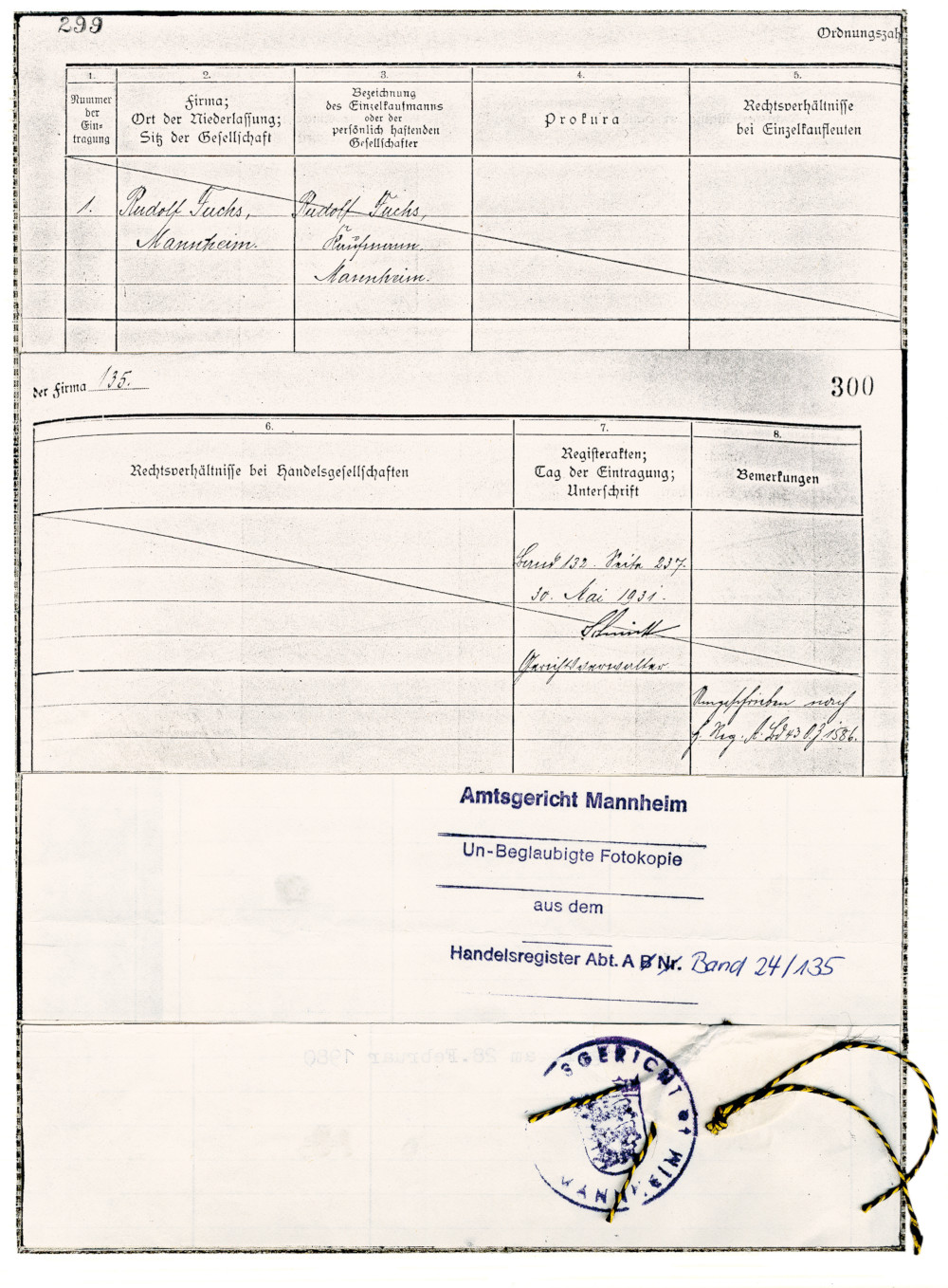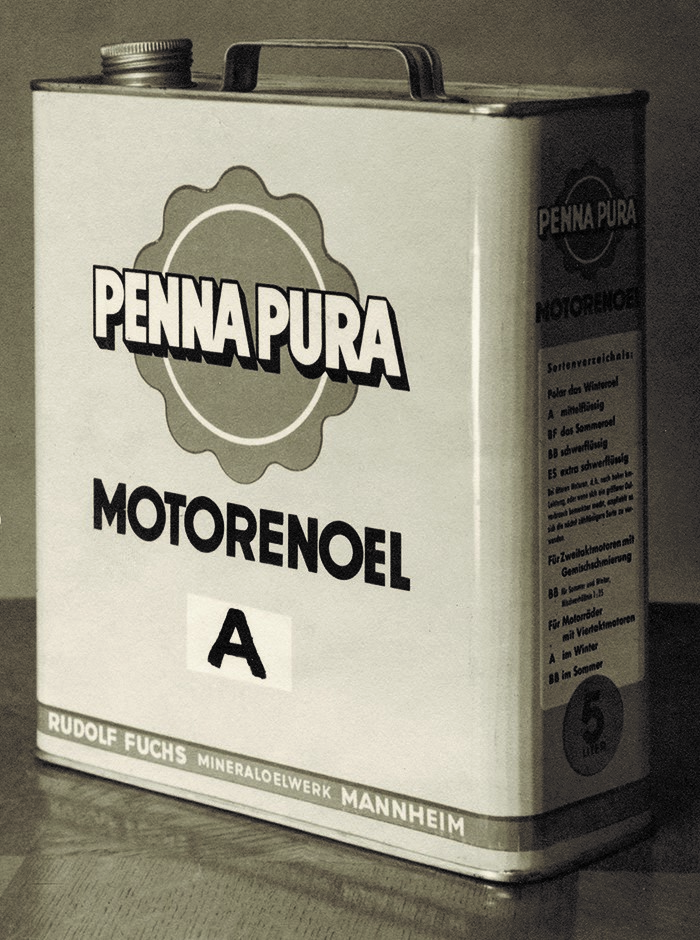FUCHS SCHMIERSTOFFE GmbH is the founding company of the FUCHS Group. Today it is the largest FUCHS company, with roughly 900 employees, three plants and sales revenues of over €700 million. It is active not only in Germany but also worldwide.
Rudolf Fuchs certainly cannot be accused of lacking courage. Mannheim in 1931 was not exactly the ideal location for starting up your own business. After the Treaty of Versailles came into force, the French were in charge on the left bank of the Rhine, and industry in Mannheim was cut off from its important markets in Alsace-Lorraine and Saarland. Transshipment at the port of Mannheim was in decline and unemployment rose to unprecedented heights. But this 21 year old, who had just completed his training at a trading firm in Mannheim, where he took care of lubricants wholesale as a newly qualified import tradesman, did not let such obstacles get in his way. He had a vision and the irrepressible will to succeed.
Clearly recognizing the opportunities presented by the lubricant business in an era of increasing motorization and knowing the importance of Mannheim in long-distance transport, Rudolf Fuchs risked taking the step to become an entrepreneur. On 30 May, the newly founded company RUDOLF FUCHS was recorded into the trade register of the Mannheim District Court. At the first company premises in the Mannheim abattoir, together with his wife Irma, who constantly supported him in his endeavors, the young entrepreneur filled canisters with the unbeatable product of the time, “Guaranteed Pennsylvania Motor Oil”. He called it “PENNA PURA”, loaded it onto his bicycle and sold it at the port to the transport companies based there.

Trade register entry of the company RUDOLF FUCHS on May 30, 1931.

PENNA PURA Engine Oil
The new company was off to a flying start. FUCHS expanded, relocation followed relocation, and the sales program was broadened. In 1936, the fledgling company started making its own products. In 1937, Rudolf Fuchs bought a plot of land ripe for development on Friesenheimer Insel in the north of Mannheim. It remains to this day the location of the Mannheim headquarters of FUCHS.
1939 was the most important year to date in the company’s history: Imports of oil from the USA stopped with the outbreak of war. Rudolf Fuchs decided to manufacture his own on a grand scale. The inauguration of the new building on Friesenheimer Insel, in which over 30 employees were already employed, provided the space required for this decision. The changeover to production of lubricants brought with it a new name for the company, RUDOLF FUCHS MINERALOELWERK, and it grew rapidly.
In 1963, four years after the death of the company’s founder Rudolf Fuchs in 1959, his son Manfred Fuchs took up the reins of the company and less than 10 years later – in 1972 – he restructured it into a corporate group. German operational activities were outsourced and hived off in FUCHS MINERALOELWERKE GmbH. And so, the predecessor to today’s FUCHS SCHMIERSTOFFE was born.

Factory II opens in Mannheim on Friesenheimer Insel in the mid-fifties.
Apart from the original plant in Mannheim, in which around 80 percent of the approximately 900 employees are located, the German FUCHS subsidiary also produces at two additional sites, as Stefan Knapp, CEO of FUCHS SCHMIERSTOFFE, reports. Back in 1883, Friedrich Harmsen, an innkeeper from Kiel, founded his own mineral oil plant and sold his vehicle and machine grease in the entire North German area and over the Baltic Sea as far as Königsberg (now Kaliningrad). The grease factory in Kiel has belonged to the FUCHS Group since 2002. The road to the Mannheim lubricant specialist led through a joint venture between FUCHS and DEA Mineralöl AG, to whom Max, son of the founder, had sold the company in 1951. After this cooperation had ended, the grease factory remained in the hands of FUCHS, and today the entire grease production of FUCHS SCHMIERSTOFFE is concentrated at this site.
Pentosin-Werke, headquartered in Wedel, was founded in 1927, and taken over by FUCHS in 2015 and incorporated into FUCHS SCHMIERSTOFFE GmbH. “This acquisition allowed us to expand our portfolio, particularly in the field of dual-clutch transmission oils,” says Knapp. The original plant in Wedel, with its research and development laboratories, as well as the test area for transmission oils, is still operational, while the second plant in Dormagen was sold at the end of last year.
The fact that the sales of FUCHS SCHMIERSTOFFE managed to continue to grow over recent years even in a saturated and competitive market such as Germany can be attributed above all to the acquisition of Pentosin. “In our domestic market, it is above all a case of maintaining our current strong position. Demand in the majority of our product groups remains high,” says a satisfied Knapp. Potential is generated first and foremost through innovation – a topic that is high on the agenda at FUCHS SCHMIERSTOFFE in light of the pending shake-up of drive concepts. “Even though the current proportion of electrical or hybrid vehicles is still very small, the new drives of our key German OEM clients already play a huge role. This is perhaps a glimpse of what things will look like in five years’ time – and we have to be ready for that,” confirms Knapp. A specialist in e-mobility monitors the trends and developments in this field as part of a newly created post. Formulations for lubricants that meet the requirements of electrical vehicles are being developed in laboratories, and entirely new products are also in the pipeline. “The lubricants may gain importance in this context,” says Knapp. “This is an area in which we are currently very successful, thanks to new developments in cars such as power steering and the electric parking brake.”
The challenge FUCHS SCHMIERSTOFFE has set for itself is to stabilize and expand existing business in the various market sectors, while still providing the resources needed to explore new areas in greater depth. Aside from new drive technologies, digitalization is particularly high on the agenda in this regard. We would like to offer our clients in the industry the service of digitally monitoring the state of their cooling lubricants using sensors in order to allow proactive maintenance. This is not a short-term growth strategy. Rather it’s about increasing the efficiency of our processes and that of our clients.”
“FUCHS SCHMIERSTOFFE contributes roughly one quarter to our global revenue and roughly one half to our revenue in Europe, but its significance extends far beyond this. Our subsidiary companies throughout the world benefit from the decades-long experience and expertise of the nucleus of the corporation. We are delighted with the healthy exchange.”
FUCHS SCHMIERSTOFFE wants to use substantial investments to prepare the company for the future. A new high-bay warehouse for raw materials and a new office building in Mannheim have been given the green light. Further investments in the expansion of production and filling capabilities are planned for Mannheim, Wedel and Kiel.
Another matter for FUCHS SCHMIERSTOFFE is the sustainability of the product ranges and of the company itself. Supporting initiatives such as the industry benchmark of the “Verband Schmierstoff- industrie” and optimizing energy management are high on the agenda. “Using the self-assessment check at the end of 2017, we have already been able to draw up several approaches for making improvements and we are in close contact with the sustainability specialists in the holding company,” says Knapp. “We can also already offer our clients products that improve sustainability, but even though we are well on the way to solving this challenge, we certainly haven’t got there yet.”
Although the focus of FUCHS SCHMIERSTOFFE is on the headquarters in Mannheim and the German market, the largest FUCHS subsidiary is also active on an international scale. “We are serving many markets in which FUCHS has no physical foothold,” says Knapp, describing this key objective. “These include countries such as Mongolia and Kazakhstan, but also countries in South America. In these places, we can win clients over with products bearing a ‘Made in Germany’ label. We supply aftermarket products in the automotive sector in particular, but also lubricants for industry.”
A large proportion of the revenue generated by FUCHS SCHMIERSTOFFE flows in from business with sister companies, above all in China. “We are profiting greatly from the global positioning and presence of the corporation,” emphasizes Knapp. “Just to be absolutely clear, many of our operations, particularly with OEM clients in the automotive sector, are only running because we can also supply our clients internationally via our companies based in the respective countries. This is often a decisive factor during negotiations.” It is obvious that FUCHS colleagues abroad must be supported where necessary. A particular strength of FUCHS SCHMIERSTOFFE lies in their expertise in automotive lubricants, with excellent capacity for research and development and for test stands.
“Our company’s success story began in Mannheim in 1931, and FUCHS SCHMIERSTOFFE has gone on to attain a leading position in Germany in the lubricant market. Germany is as ever one of our most important markets and one that still offers us a wealth of opportunities. I am sure that we will continue to expand in our home country and strengthen our position here through numerous innovations. I am looking forward to the coming years.”
Automotive products, from engine oils to shock absorber oils, therefore make up the majority of the revenue for FUCHS SCHMIERSTOFFE and are used in the first fill and aftermarket sectors. “But it is our strategic goal to cover as many bases as possible,” acknowledges Knapp. FUCHS SCHMIERSTOFFE is therefore counting on a broad portfolio of industrial lubricants, which is constantly being broadened.
There is no shortage of challenges facing FUCHS SCHMIERSTOFFE. Not only issues such as getting to grips with new drive technologies, improving digital literacy, the varied nature of the markets in which FUCHS SCHMIERSTOFFE is active, dealing with divergent legal regulations throughout the world and acquiring qualified staff, but also everyday problems such as the lack of capacity for shipping, manual work and other services. “But that’s what makes our line of work exciting and diverse,” says Knapp.

The executive team at FUCHS SCHMIERSTOFFE: (l-r) Kay-Peter Wagner, Stefan Knapp and Jörg Vogel


